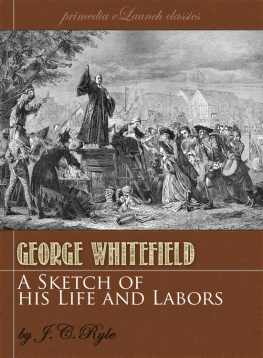J C Ryle - Thoughts for young men
Here you can read online J C Ryle - Thoughts for young men full text of the book (entire story) in english for free. Download pdf and epub, get meaning, cover and reviews about this ebook. City: Amityville, NY, year: 1996, publisher: Calvary Press, genre: Religion. Description of the work, (preface) as well as reviews are available. Best literature library LitArk.com created for fans of good reading and offers a wide selection of genres:
Romance novel
Science fiction
Adventure
Detective
Science
History
Home and family
Prose
Art
Politics
Computer
Non-fiction
Religion
Business
Children
Humor
Choose a favorite category and find really read worthwhile books. Enjoy immersion in the world of imagination, feel the emotions of the characters or learn something new for yourself, make an fascinating discovery.
Thoughts for young men: summary, description and annotation
We offer to read an annotation, description, summary or preface (depends on what the author of the book "Thoughts for young men" wrote himself). If you haven't found the necessary information about the book — write in the comments, we will try to find it.
Thoughts for young men — read online for free the complete book (whole text) full work
Below is the text of the book, divided by pages. System saving the place of the last page read, allows you to conveniently read the book "Thoughts for young men" online for free, without having to search again every time where you left off. Put a bookmark, and you can go to the page where you finished reading at any time.
Font size:
Interval:
Bookmark:
Thoughts For Young Men
By:
J. C. Ryle
Ryle was born at Macclesfield, andwas educated at Eton and at Christ Church, Oxford, where he was Craven Scholarin 1836. He was an athlete who rowed and played Cricket for Oxford, where hetook a first class degree in Greats and was offered a college fellowship(teaching position) which he declined. The son of a wealthy banker, he wasdestined for a career in politics before choosing a path of ordained ministry.While hearing Ephesians 2 read in church in 1838, he felt a spiritual awakeningand was ordained by Bishop Sumner at Winchester in 1842. For 38 years he was aparish vicar, first at Helmingham and later at Stradbrooke, in Suffolk. Hebecame a leader of the evangelical party in the Church of England and was notedfor his doctrinal essays and polemical writings.
After holding a curacy at Exbury inHampshire, he became rector of St Thomas's, Winchester (1843), rector ofHelmingham, Suffolk (1844), vicar of Stradbroke (1861), honorary canon ofNorwich (1872), and Dean of Salisbury (1880). However before taking the latteroffice, he was advanced to the new see of Liverpool, where he remained untilhis resignation, which took place three months before his death at Lowestoft.His appointment to Liverpool was at the recommendation of the outgoing PrimeMinister Benjamin Disraeli. In his diocese, he formed a clergy pension fund forhis diocese and built over forty churches. Controversially, he emphasizedraising clergy salaries ahead of building a cathedral for his new diocese. Heretired in 1900 at age 83 and died later the same year. He is buried in the AllSaints' Church, Childwall, Liverpool.
When the Apostle Paul wrote hisEpistle to Titus about his responsibility as a minister, he mentioned young menas a group requiring particular attention. After speaking of older men andolder women, and young women, he adds this advice, "Encourage the youngmen to be self-controlled" (Titus 2:6). I am going to follow the Apostle'sadvice. I propose to offer a few words of friendly exhortation to young men.
I am growing old myself, but thereare few things that I can remember so well as were the days of my youth. I havea most distinct recollection of the joys and the sorrows, the hopes and thefears, the temptations and the difficulties, the mistaken judgments and themisplaced affections, the errors and the aspirations, which surround andaccompany a young man's life. If I can only say something to keep some youngman walking in the right way, and preserve him from faults and sins, which mayhurt his prospects both for time and eternity, I shall be very thankful. Thereare four things which I propose to do:
1. I will mention some general REASONS why young men needexhorting. 2. I will note some special DANGERS which young men need to bewarned about. 3. I will give some general COUNSEL which I beg young men toreceive. 4. I will set down some special RULES OF CONDUCT which I stronglyadvise young men to follow. On each of these four points I have something tosay, and I pray to God that what I say may do good to some soul.
What are the general reasons whyyoung men need specific exhortation? I will mention several of them in order.
(1)For one thing,there is the painful fact that there are few young men anywhere who seem to beChristians.
I speak without respect of persons;I say it of all. Rich or poor, gentle or rough, educated or uneducated, in thecity or in the country--it makes no difference. I shudder to think how fewyoung men are led by the Spirit, how few are on that narrow road which leads tolife, how few are setting their affections on things above, how few are takingup the cross, and following Christ. I say all this with sorrow, but I believe,in God's sight, that I am saying nothing more than the truth.
Young men, you form a large andmost important class in the population of this country; but where, and in whatcondition, are your souls? Regardless of where we turn for an answer, thereport will be one and the same! Let us ask any faithful minister of thegospel, and note what he will tell us. How many unmarried young people can heremember who come to the Lord's Supper?
Who are the most backward about thedoctrines of salvation, the most irregular about Sunday services, the mostdifficult to draw to weekly Bible studies and prayer meetings, the mostinattentive to whatever is being preached? Which part of his congregation fillshim with the most anxiety?
Who are the Reubens for whom he has the deepest"searchings of heart"?
Who in his flock are the hardest tomanage, who require the most frequent warnings and rebukes, who cause him thegreatest uneasiness and sorrow, who keep him most constantly in fear for theirsouls, and seem the most hopeless? Depend on it, his answer will always be,"The Young Men."
Let us ask the parents in anycounty throughout this land, and see what they will generally say. Who in theirfamilies give them the most pain and trouble?
Who need the most watchfulness, andmost often provoke and disappoint them? Who are the first to be led away fromwhat is right, and the last to remember cautions and good advice? Who are themost difficult to keep in order and limits? Who most frequently break out intoopen sin, disgrace the name they bear, make their friends unhappy, embitter theolder relatives, and cause them to die with sorrow in their hearts? Depend onit, the answer will generally be, "The Young Men."
Let us ask the judges and policeofficers, and note what they will reply. Who goes to the night clubs and barsthe most? Who make up street gangs? Who are most often arrested fordrunkenness, disturbing the peace, fighting, stealing, assaults, and the like?Who fill the jails, and penitentiaries, and detention homes? Who are the classwhich requires the most incessant watching and looking after? Depend on it,they will at once point to the same group, they will say, "The YoungMen."
Let us turn to the upper classes,and note the report we will get from them. In one family the sons are alwayswasting time, health, and money, in the selfish pursuit of pleasure. Inanother, the sons will follow no profession, and fritter away the most preciousyears of their life in doing nothing. In another, they take up a profession asa mere form, but pay no attention to its duties. In another, they are alwaysforming wrong connections, gambling, getting into debt, associating with badcompanions, keeping their friends in a constant fever of anxiety. Note thatrank, and title, and wealth, and education, do not prevent these things!Anxious fathers, and heart-broken mothers, and sorrowing sisters, could tellsad stories about them, if the truth were known. Many a family, with everythingthis world can give, numbers among its relatives some name that is never named,or only named with regret and shame, some son, some brother, some cousin, somenephew, who will have his own way, and is a grief to all who know him.
There is seldom a rich family whichhasn't got some thorn in its side, some blot in its page of happiness, someconstant source of pain and anxiety; and often, far too often--the true causeis, "The Young Men"?
What shall we say to these things?These are facts, plain facts, facts which meet us on every side, facts whichcannot be denied. How dreadful this is!
How dreadful the thought, thatevery time I meet a young man, I meet one who is in all probability all enemyof God, traveling on the wide road which leads to hell, unfit for heaven!Surely, with such facts before me, will you not wonder that I exhort you, youmust allow that there is a good reason.
(2) Death andjudgment are waiting for young men, even as it waits for others, and theynearly all seem to forget it.
Young men, it is appointed for youto die; and no matter how strong and healthy you may be now, the day of yourdeath is perhaps very near. I see young people sick as well as the elderly. Ibury youthful corpses as well as aged. I read the names of persons no olderthan yourselves in every graveyard. I learn from books that, excepting infancyand old age, more die between thirteen and twenty-three than at any otherperiod of life. And yet you live as if you were sure that presently you willnever die.
Next pageFont size:
Interval:
Bookmark:
Similar books «Thoughts for young men»
Look at similar books to Thoughts for young men. We have selected literature similar in name and meaning in the hope of providing readers with more options to find new, interesting, not yet read works.
Discussion, reviews of the book Thoughts for young men and just readers' own opinions. Leave your comments, write what you think about the work, its meaning or the main characters. Specify what exactly you liked and what you didn't like, and why you think so.


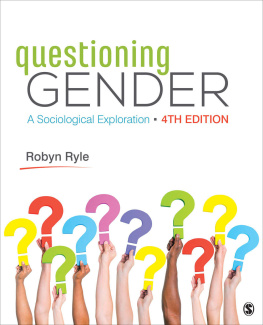
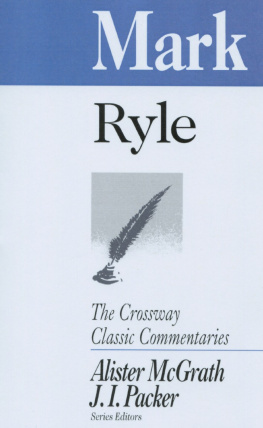

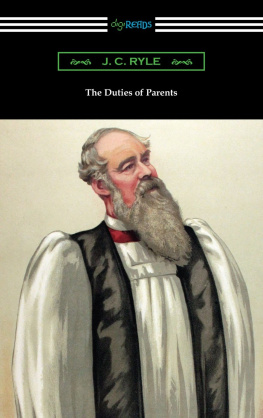
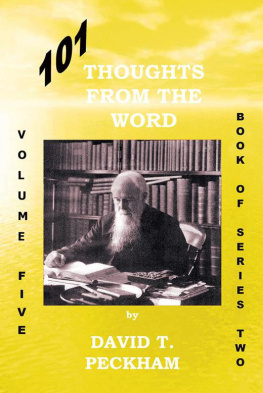
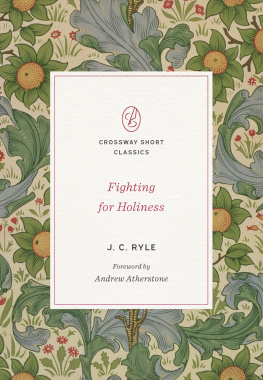

![J. C. Ryle - The Cross [Annotated, Updated]: Crucified with Christ, and Christ Alive in Me](/uploads/posts/book/150302/thumbs/j-c-ryle-the-cross-annotated-updated.jpg)
